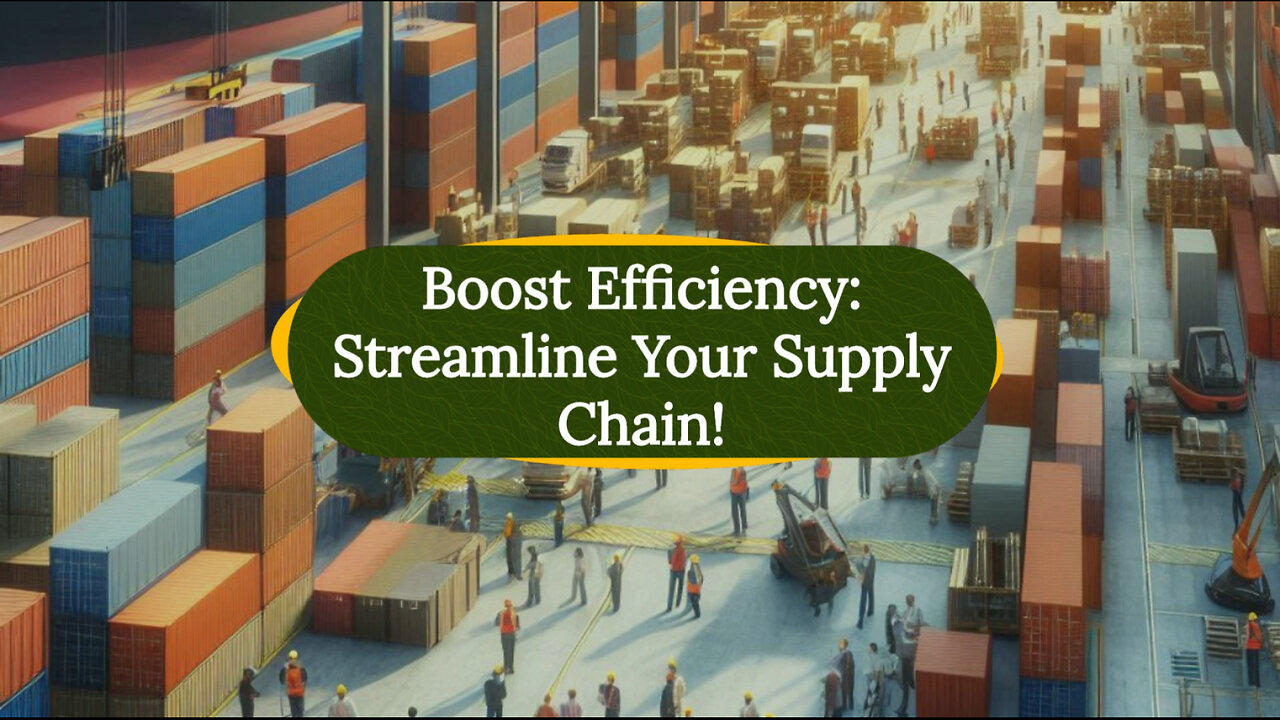Premium Only Content

Streamlining the Supply Chain: Customs Brokerage, Bonds, Automation, and More!
ISF Filer || isf@isffiler.com || 858-280-9374 || www.isffiler.com
In this episode, we discussed various strategies and concepts on how to streamline supply chain processes. One of the key aspects we explored is customs brokerage and its role in facilitating the smooth movement of goods across international borders. Hiring a customs broker can greatly benefit businesses by helping them navigate the complexities of import and export requirements, saving time, and minimizing risks.
We also touched upon the importance of having a customs bond, which is a financial guarantee between the importer and the government. Customs bonds are required by Customs and Border Protection (CBP) to ensure that the necessary duties, taxes, and fees associated with importing goods are paid, and to protect the revenue and ensure compliance with trade laws.
An effective shipment tracking system is another crucial component of a streamlined supply chain. By leveraging advanced technology and software, businesses can have real-time visibility into the movement of their goods, allowing them to proactively address any potential delays or issues. This results in smoother operations and improved customer satisfaction.
We also discussed the Importer Security Filing (ISF) requirement by CBP, which mandates the submission of specific shipment information before the cargo is loaded onto a vessel bound for the United States. By providing this information in advance, CBP can conduct risk assessments, enhancing border security while facilitating trade.
Collaboration and communication are vital in streamlining supply chain processes. By establishing strong relationships with suppliers, carriers, and logistics partners and sharing information, the entire supply chain can be aligned, resulting in improved efficiency, reduced costs, and faster delivery times.
Automation is another crucial aspect that can greatly enhance supply chain efficiency. By leveraging robotic systems, Internet of Things (IoT) devices, and artificial intelligence, businesses can minimize manual intervention, optimize inventory management, and streamline order fulfillment. Automating repetitive tasks can result in reducing errors and improving overall operational efficiency.
Lastly, participating in a global trade network can greatly enhance supply chain efficiency. Joining industry associations, trade organizations, and utilizing global trade platforms can provide access to valuable resources, networking opportunities, and industry knowledge. Staying connected and informed helps businesses adapt to changing trade policies, regulations, and emerging market trends.
Overall, by implementing these strategies and concepts, businesses can streamline their supply chain processes, optimize operations, and achieve success in international trade. Thank you for watching, and make sure to tune in to our upcoming videos for more valuable information and tips on customs brokerage and international trade.
#usimportbond #isfcustomsbroker #uscustomsclearing #isfentry
Video Disclaimer Here: This video is intended for educational purposes and has no affiliation with US government entities.
1:18 - Implementing an effective shipment tracking system using advanced technology is crucial for optimizing the supply chain and ensuring real-time visibility into goods movement.
1:57 - Collaboration and communication with suppliers, carriers, and logistics partners are essential elements for streamlining supply chain processes.
2:27 - Leveraging robotic systems, Internet of Things devices, and artificial intelligence can minimize manual intervention, optimize inventory management, and streamline order fulfillment to improve operational efficiency.
3:11 - Key strategies for streamlining supply chain processes include customs brokerage, customs bonds, ISF filings, automation, and participation in global trade networks to achieve success in international trade.
-
 LIVE
LIVE
TimcastIRL
2 hours agoTrans Shooter Targets Catholic Kids In Mass Shooting, Leftists Reject Prayers | Timcast IRL
7,866 watching -
 LIVE
LIVE
SpartakusLIVE
4 hours ago#1 Birthday Boy Celebrates with MASSIVE and HUGE 4.8-Hour Stream
475 watching -
 LIVE
LIVE
Man in America
5 hours agoFrom Oil Barons to Pill Pushers: The Rockefeller War on Health w/ Jeff Adam
582 watching -
 LIVE
LIVE
Barry Cunningham
3 hours agoBREAKING NEWS: PRESIDENT TRUMP THIS INSANITY MUST END NOW!
11,872 watching -
 LIVE
LIVE
StevieTLIVE
1 hour agoWednesday Warzone Solo HYPE #1 Mullet on Rumble
72 watching -
 5:58
5:58
Mrgunsngear
3 hours ago $0.38 earnedBreaking: The New Republican Party Chairman Is Anti 2nd Amendment
1.11K3 -
 LIVE
LIVE
Geeks + Gamers
2 hours agoGeeks+Gamers Play- MARIO KART WORLD
234 watching -
![(8/27/2025) | SG Sits Down Again w/ Sam Anthony of [Your]News: Progress Reports on Securing "We The People" Citizen Journalism](https://1a-1791.com/video/fww1/d1/s8/6/G/L/3/c/GL3cz.0kob.1.jpg) 29:34
29:34
QNewsPatriot
3 hours ago(8/27/2025) | SG Sits Down Again w/ Sam Anthony of [Your]News: Progress Reports on Securing "We The People" Citizen Journalism
3.08K1 -
 25:12
25:12
Jasmin Laine
7 hours agoDanielle Smith’s EPIC Mic Drop Fact Check Leaves Crowd FROZEN—Poilievre FINISHES the Job
3.68K16 -
 LIVE
LIVE
ZWOGs
11 hours ago🔴LIVE IN 1440p! - SoT w/ Pudge & SBL, Ranch Sim w/ Maam & MadHouse, Warzone & More - Come Hang Out!
57 watching